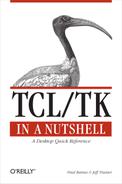Data Types
The more commonly used Tcl data structures are listed here:
ClientDataApplication-defined data that can be stored by interpreter
Tcl_AsyncHandlerToken used to refer to asynchronous event handlers
Tcl_ChannelA Tcl I/O channel
Tcl_ChannelProcFunction implementing operations on an I/O channel
Tcl_ChannelTypePointers to functions implementing operations on an I/O channel
Tcl_CloseProcType of procedure used by close and delete handlers
Tcl_CmdDeleteProcType of procedure called when Tcl command is deleted
Tcl_CmdInfoStructure containing information about a Tcl command
Tcl_CmdProcType of procedure used to implement a Tcl command
Tcl_CommandToken used to refer to Tcl command procedures
Tcl_DStringStructure used for Tcl dynamic strings
Tcl_EventData structure used by Tcl event queue
Tcl_EventCheckProcType of procedure for checking event queue
Tcl_EventDeleteProcType of procedure to invoke for delete events
Tcl_EventSetupProcType of procedure to invoke for prepare events
Tcl_ExitProcType of procedure to invoke before exiting application
Tcl_FileProcType of procedure to invoke for file handler
Tcl_FreeProcType of procedure for freeing storage
Tcl_HashEntryTcl hash table entry
Tcl_HashTableStructure for Tcl hash table
Tcl_InterpStructure defining a Tcl interpreter
Tcl_InterpDeleteProcProcedure to call when interpreter is deleted
Tcl_ObjDual-ported object type for Tcl values
Tcl_ObjCmdProcType of procedure used to implement a Tcl command
Tcl_ObjTypeStructure for representing type of Tcl object
Tcl_RegExpCompiled regular expression
Tcl_TimeData structure to represent time intervals
Tcl_TraceToken for command trace
Tcl_VarTraceProcType of procedure to call for command tracing
